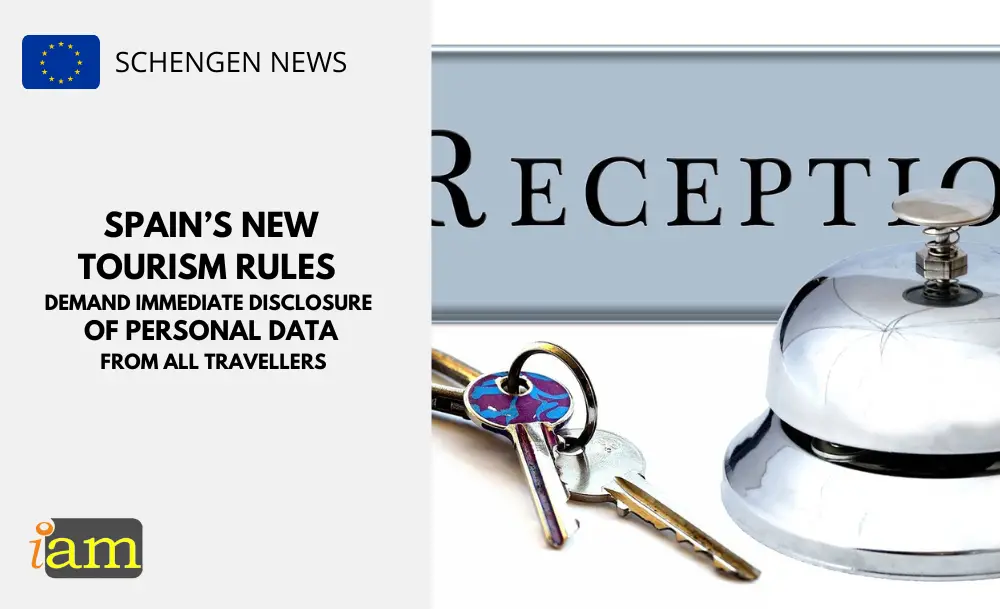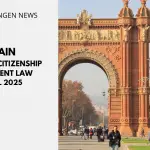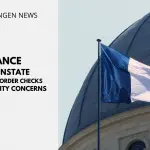Spain’s New Tourism Rules Demand Immediate Disclosure of Personal Data from All Travellers

Starting October 1, Spain will roll out strict new regulations for international visitors, including travellers from the U.S., as part of an effort to boost national security.
These changes could significantly influence how travellers plan their trips to Spain, making it essential to stay informed about what’s ahead.
When checking into a hotel, it’s typical to hand over a passport and credit card for verification. Most of us do it without a second thought, as this process is standard practice worldwide to ensure both payment security and identity verification.
But Spain’s latest move under Royal Decree 933/2021 goes much further than this familiar routine.
Starting in October, hotels, private rentals (like Airbnb), and other accommodations in Spain will be required to submit guest information directly to the police using a new digital system. This not only applies to foreign tourists but also to domestic travellers, giving Spanish authorities deeper insight into who is staying where and for how long.
What Personal Data Will Be Collected?
If you’re planning to visit Spain, get ready to share much more than just your name and passport number.
Accommodations are now required to submit personal information, including:
- Full name
- Gender
- Passport details (number, issuing country)
- Nationality
- Date of birth
- Complete address
- Contact details (phone numbers, email)
- Information about your travel companions
- Transaction records, including the contract and signing date
- Arrival and departure details
The most controversial requirement is the collection of payment details, including:
- Method of payment (cash, credit card, digital platforms)
- Card or account details (card number, IBAN, etc.)
- Name on the payment card
- Expiration date
Why Is It A Concern?
Not surprisingly, these new regulations have sparked strong reactions. Many see this as an overreach, dubbing it a “Big Brother” move by the Spanish government. Critics argue that it gives authorities an unprecedented ability to monitor tourists, track their movements, and even access their financial information.
The Spanish Confederation of Hotels and Tourist Accommodations (Cehat) has been vocal in its opposition, raising concerns about the legal uncertainties, potential security risks, and the heavy administrative burden placed on the tourism sector. With this new law, authorities can effectively track visitors throughout their stay, adding to concerns over privacy and safety.
On the other hand, the Spanish government maintains that the new regulations are necessary for national security. The Ministry of the Interior argues that knowing exactly who is in the country and where they’re staying will help authorities better protect citizens and tourists alike.
Spain is one of the most popular travel destinations in the world, second only to France, and could overtake its neighbour within the next decade. However, with these new rules, it remains to be seen whether the allure of Spain’s vibrant cities, beautiful beaches, and rich history will be enough to offset concerns about privacy and data security for future travellers.
The Impact on Travellers
Will these new regulations make travellers think twice about visiting Spain? That’s the question on everyone’s mind. While it’s clear that security is a priority, the growing concerns about how much personal data will be shared and who will have access to it could influence travel decisions in the years to come.
For now, if you’re heading to Spain, be prepared to disclose more than you might be comfortable with and stay tuned as the debate over these new measures unfolds.
Do you need to renew your passport? Talk to us in the comment section below. Or if you need more advice on the above, contact us for further travel & immigration advice.
Check out the deals we have found below and tell us your travel plans.
Check out the offers and discounts from:
And because of the pandemic, don’t forget to get your travel insurance, which will cover you for flight disruptions and pandemic related matters.
IaM can help with your visa application to Europe, the United States, the UK & other countries
If you need help with a US visa, a UK Visa, or a visa to Europe, including help with appointment booking obligations, IaM can help. For more information and advice on US immigration, UK immigration law and US visa applications or if you need any help or assistance please, reach out to your Visa Coordinator at IaM.
Some of our posts include affiliate links. If you choose to purchase any of these products, we might get a small commission. For more information, check out our TOS.
- Portugal Plans For Longer Residency and Stricter Visa Rules Ahead - 9 July 2025
- EES Gets Green Light For Phased Border Control Rollout - 8 July 2025
- ESTA Fee for US Travel Set To Increase - 7 July 2025











